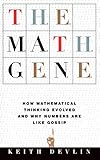

Cliquer sur une vignette pour aller sur Google Books.
|
Chargement... The Math Gene: How Mathematical Thinking Evolved And Why Numbers Are Like Gossip (2000)par Keith Devlin
 Aucun Actuellement, il n'y a pas de discussions au sujet de ce livre.   ) )In 'Das Mathe-Gen' geht es nicht um ein wirklich vorhandenes Gen im biologischen Sinn. Keith Devlin benutzt den Begriff, um seinen Lesern seine Theorie zu erklären, dass Mathematik eigentlich eine angeborene Fähigkeit ist und mit der Sprache gemeinsame biologische Wurzeln hat. Im Buch beschreibt Devlin verschiedene Theorien zum Spracherwerb und warum wir überhaupt Sprache nutzen können. Von der Vergrößerung des Hirnvolumens als Voraussetzung bis hin zu der einfach erscheinenden Fähigkeit von Kleinkindern grammatisch korrekte Sätze zu bilden und Sprache überhaupt zu verstehen, handelt ein Teil des Buches. Aber wäre dies alles, wäre dieses Buch kein Plädoyer für die Mathematik sondern ein Buch für sprachwissenschaftlich interessierte Leser. Devlin zählt weiter Ergebnisse von Experimenten und Tests auf, die zeigen, dass auch andere Tiere und Kleinkinder einen angeborenen Sinn für Mengen besitzen. Des Weiteren werden Abstraktionsvermögen, ein Sinn für die Mustererkennung und ein räumlicher Orientierungssinn für die Mathematik benötigt alles Fähigkeiten die der Mensch auch bei der Bildung von Sprache tagtäglich braucht. Devlin bringt seine Theorie auf anschauliche Weise seinen Lesern näher und erklärt auch noch, warum Mathematik eine Seifenoper ist. In 'Das Mathe-Gen' geht es nicht um ein wirklich vorhandenes Gen im biologischen Sinn. Keith Devlin benutzt den Begriff, um seinen Lesern seine Theorie zu erklären, dass Mathematik eigentlich eine angeborene Fähigkeit ist und mit der Sprache gemeinsame biologische Wurzeln hat. Im Buch beschreibt Devlin verschiedene Theorien zum Spracherwerb und warum wir überhaupt Sprache nutzen können. Von der Vergrößerung des Hirnvolumens als Voraussetzung bis hin zu der einfach erscheinenden Fähigkeit von Kleinkindern grammatisch korrekte Sätze zu bilden und Sprache überhaupt zu verstehen, handelt ein Teil des Buches. Aber wäre dies alles, wäre dieses Buch kein Plädoyer für die Mathematik sondern ein Buch für sprachwissenschaftlich interessierte Leser. Devlin zählt weiter Ergebnisse von Experimenten und Tests auf, die zeigen, dass auch andere Tiere und Kleinkinder einen angeborenen Sinn für Mengen besitzen. Des Weiteren werden Abstraktionsvermögen, ein Sinn für die Mustererkennung und ein räumlicher Orientierungssinn für die Mathematik benötigt alles Fähigkeiten die der Mensch auch bei der Bildung von Sprache tagtäglich braucht. Devlin bringt seine Theorie auf anschauliche Weise seinen Lesern näher und erklärt auch noch, warum Mathematik eine Seifenoper ist. aucune critique | ajouter une critique
Prix et récompenses
Why is math so hard? And why, despite this difficulty, are some people so good at it? If there's some inborn capacity for mathematical thinking--which there must be, otherwise no one could do it --why can't we all do it well? Keith Devlin has answers to all these difficult questions, and in giving them shows us how mathematical ability evolved, why it's a part of language ability, and how we can make better use of this innate talent.He also offers a breathtakingly new theory of language development--that language evolved in two stages, and its main purpose was not communication--to show that the ability to think mathematically arose out of the same symbol-manipulating ability that was so crucial to the emergence of true language. Why, then, can't we do math as well as we can speak? The answer, says Devlin, is that we can and do--we just don't recognize when we're using mathematical reasoning. Aucune description trouvée dans une bibliothèque |
Discussion en coursAucunCouvertures populaires
 Google Books — Chargement... Google Books — Chargement...GenresClassification décimale de Melvil (CDD)510.1Natural sciences and mathematics Mathematics General Mathematics Philosophy And PsychologyClassification de la Bibliothèque du CongrèsÉvaluationMoyenne: (3.8) (3.8)
Est-ce vous ?Devenez un(e) auteur LibraryThing. |
||||||||||||||||||||||||||||||||||||||||||||||||||||||||||||||||||||||||||||||||||||||||||||||||||||||||||||||||||||||||